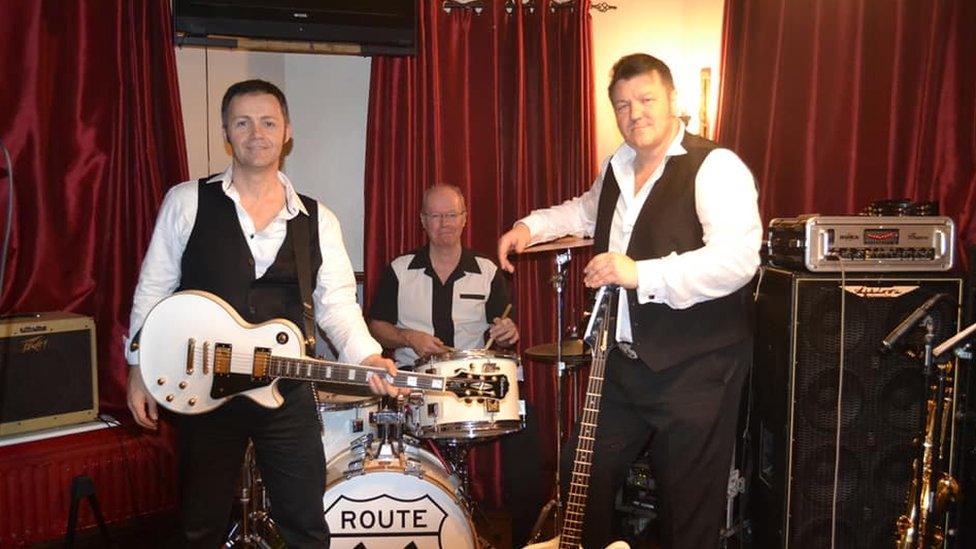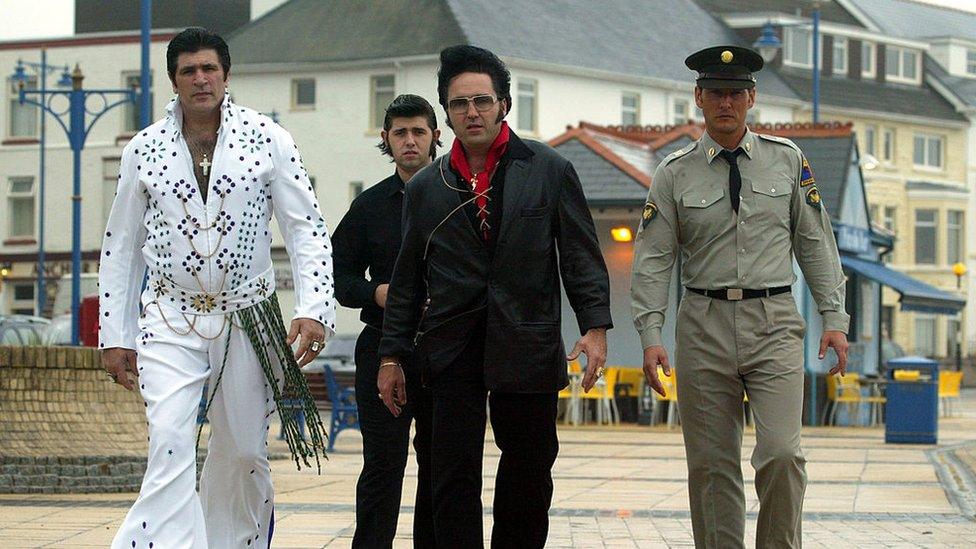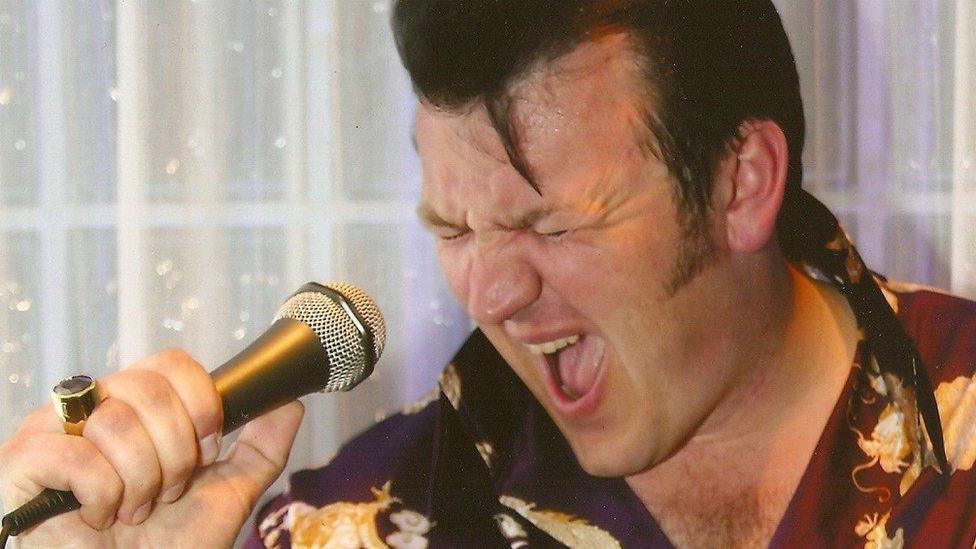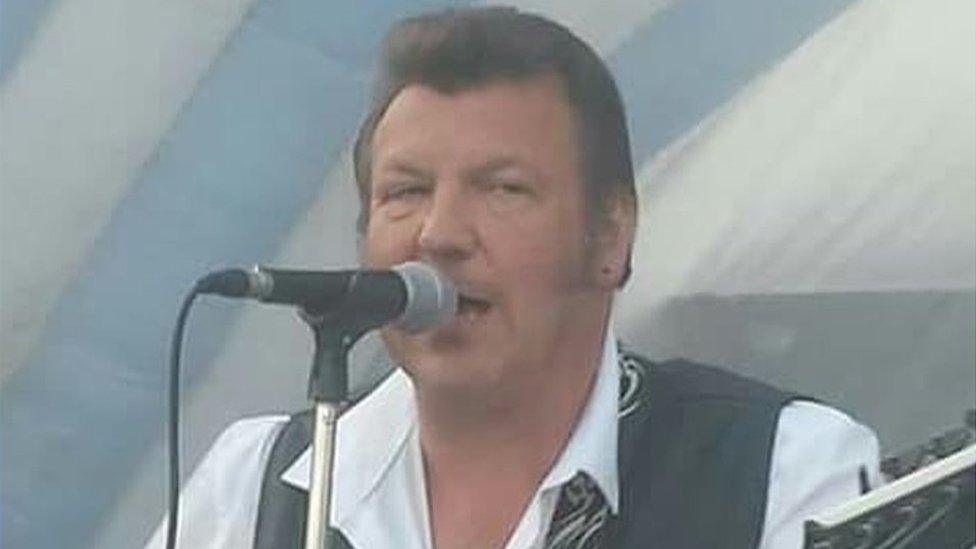Covid in Wales: Pub singers 'out of pocket with no compensation'
- Published

Dave Riley (far right) says he has lost over £2,500 in cancelled gigs between Boxing Day and New Year
Cancelled New Year's Eve celebrations have left pub singers thousands of pounds out of pocket with no compensation, an event founder says.
The new Covid restrictions limit indoor events to 30 seated attendees, leading many venues to cancel.
Singer Dave Riley from Porthcawl, Bridgend, said he had lost over £2,500.
The Welsh government said freelance musicians may be eligible for the Economic Resilience Fund (ERF) or a local authority discretionary fund.
"New Year's Eve is traditionally the biggest payday for for pub singers and it was removed, their incomes being basically pulled from under them at very short notice," said Peter Phillips, founder of the Porthcawl Elvis Festival.
"I think the Welsh government have been irresponsible by not putting some measures in place.
"I'm not criticising their public health measures - that's way above my pay grade to talk about - but they should have thought through who's going to be immediately impacted financially and put something in place for them."

Peter Phillips founded Porthcawl's Elvis Festival in 2004
He said many freelance musicians had been able to claim furlough during earlier lockdowns, but this was no longer possible.
First Minister Mark Drakeford has repeated his call for the UK government to restart the scheme, which cost almost £70bn.
"They should have put some support in place for these people, these people are friends of ours we've known a lot of these people for years," said Mr Phillips.
'Angry'
Dave Riley is a singer from Porthcawl who sings covers, his own material and performs an Elvis tribute act on cruises, overseas and in pubs, hotels and clubs.
He had four gigs lined up between Boxing Day and New Year's Eve, all of which have been cancelled.

Dave Riley says his work has been cancelled with "nothing in place"
"It's just come all of a sudden with no plan," he said. "All cancelled basically with nothing in place".
He said he had been banking on those gigs - which would have earned him between £2,500 and £3,000 - to see him through January, which is usually a quiet time for entertainers.
He said he had previously been unable to receive furlough and had got by on unemployment benefits and selling things on eBay.
"I'm angry this time around. I was only just getting back to normal and building things up again," he added.

Dave Riley says he was relying on money from his festive gigs to see him through January
Under Alert Level 2 rules, external, live music is allowed in pubs and other venues but a maximum of 30 people can attend.
Those in attendance must remain seated, meaning dancing is not allowed.
Table service must be provided and 2m social distancing between groups of a maximum of six people from up to six households must be observed. Face coverings must be worn when not seated at a table.
The same applies to weddings, where the only exception is that the couple's first dance is permitted.
Mr Phillips said the limited number of attendees made booking a singer financially unviable for many businesses.
On 23 December, the Welsh government outlined the details of a £120m package of financial support, external for businesses in Wales impacted by Omicron.
In a statement at the time, Economy Minister Vaughan Gething said: "We fully understand the continued challenges faced by businesses, however we are facing a very serious situation in Wales.
"A wave of infections caused by the new, fast-moving and very-infectious omicron variant is headed our way, this means taking early action to try and control its spread - and limit the impact on Welsh businesses."
He said since the start of the pandemic over £2.2bn of support had been provided to businesses throughout Wales.
The Welsh government will consider whether additional emergency funding is needed in the new year, he added.
- Published22 December 2021

- Published27 May 2022

- Published23 December 2021
